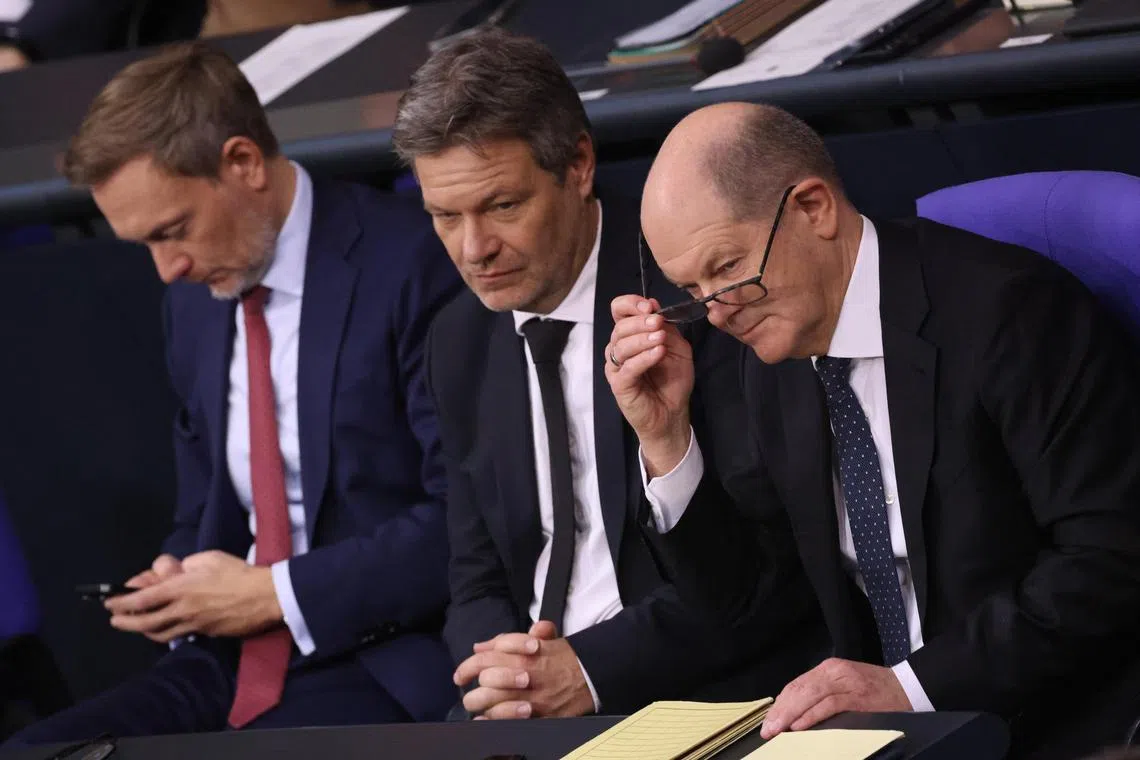Germany clinches last-minute 2024 budget deal, sticks to debt brake
Sign up now: Get ST's newsletters delivered to your inbox

(From right) German Chancellor Olaf Scholz, Economy Minister Robert Habeck and Finance Minister Christian Lindner at the German Parliament in Berlin on Dec 13.
PHOTO: EPA-EFE
Follow topic:
BERLIN – Germany’s government clinched a last-minute deal on its 2024 budget on Dec 13 that will see Berlin return to its self-imposed limits on new debt despite warnings this could hamper growth in Europe’s top economy and its green transition.
Chancellor Olaf Scholz’s three-party coalition was faced with either suspending the so-called debt brake or finding some €17 billion (S$24.6 billion) in savings after a Nov 15 Constitutional Court ruling threw its plans into disarray.
Weeks of tense talks that had raised doubts the coalition could survive ended at around 5am on Dec 13, with an agreement to go down the path of austerity – a win for fiscally hawkish junior partner the Free Democrats (FDP).
Mr Scholz of the centre-left Social Democrats nevertheless said the debt brake could be suspended again if Ukraine needed more funding
He was speaking hours before flying to Brussels to a European Union summit at which support for Kyiv will be top of the agenda.
“The government will stick to its goals... but we must do so with less money, which means cuts and savings,” Mr Scholz told a press conference, flanked by Finance Minister Christian Lindner of the FDP and Economy Minister Robert Habeck of the Greens.
“We will do this by abolishing climate-damaging subsidies, slightly reducing the expenditure of individual departments and reducing federal subsidies.”
After the court ruled that €60 billion of unused pandemic debt could not be moved to a climate and transformation fund, Mr Scholz said that fund would be reduced by €12 billion in 2024 and by €45 billion in budget planning up to 2027.
For example, it will no longer be used for upgrading of state railway firm Deutsche Bahn, which instead will be financed through the privatisation of unnecessary government stakes in companies, Mr Lindner said.
Premiums for the purchase of electric cars will be ended earlier than previously planned and subsidies for the solar industry cut.
The fund, which supports initiatives such as making buildings more energy-efficient and subsidising renewable electricity and chip production, will still have a total volume of €160 billion, Mr Scholz said.
Commerzbank chief economist Joerg Kraemer welcomed the fact the government was not trying to suspend the debt brake but said the budget consolidation measures could dampen growth by up to half a percentage point in 2024.
Others said the deal simply delayed a necessary decision on how to fund sorely needed investments in an economy that has already suffered years of chronic underinvestment. November’s court ruling has made it clear the government will not be able to resort as easily to off-budget funds going forward.
The agreement on Dec 13 is “a rotten compromise with which the federal government is just pushing the problems into the future”, said Mr Marcel Fratzscher, president of the German economic institute DIW. “Citizens are among the losers of this agreement.”
Questions remain
Germany has by far the lowest debt among the major economies in the Group of Seven, but memories of how frugality paved the way for post-war reconstruction and how costly it was to reintegrate the indebted, formerly communist East Germany have shaped a uniquely debt-averse political culture.
As such, the country enshrined a debt brake, which restricts the public deficit to 0.35 per cent of gross domestic product, into its Constitution in 2009.
But questions are growing over the brake’s suitability for the host of challenges Germany is now facing.
Berlin already had suspended it for three years to respond to the Covid-19 pandemic. The court ruling in November prompted it to suspend it again for 2023, on the basis of the energy crisis sparked by the Ukraine war, and Mr Scholz and Mr Habeck had sought another suspension in 2024.
But Mr Lindner stood firm on the need to stick to the constraint, saying on Dec 13 that “orientation towards the debt brake remained of big importance”.
The political victory could help FDP leaders face down calls from within its ranks for the party to leave Mr Scholz’s fractious coalition, whose support has slumped recently to record lows.
The FDP itself is now polling around the 5 per cent minimum threshold to enter Parliament. REUTERS

